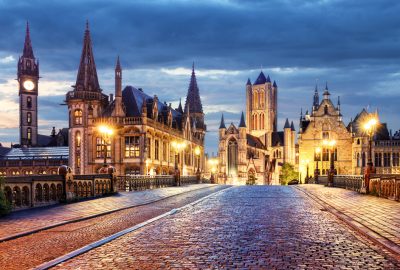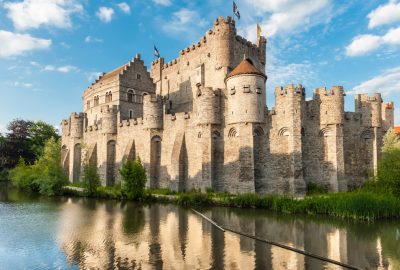Tourists often overlook Ghent as it is located in between “the big three”: Brussels, Bruges and Antwerp. But don’t let it fool you. Ghent (in Dutch: Gent and in French: Gand) is the perfect destination for anyone who aims to have a taste of Belgium without pushing through crowds of sweaty, smelly people with cameras. Bruges might me more famous with tourists and the medieval architecture and canals are astonishing. But, and I say this with all respect, it also feels too much as an open-air museum and as at nights is often deserted and boring. So my favourite pick would be Ghent since it offers the full package of wonderful medieval sights, students and a pulsating nightlife. To have a good impression Ghent’s party-minded soul and also its edgy sides watch the great movie Belgica, which was released in 2016 and tells the story of the renowned local dance café Charlatan. Gent was the largest city in Europe during the middle ages, second only to Paris and its inhabitants were known for their love for liberty, they often protested against taxes and anything that restricted their freedom. It is also known as the largest university town in the Dutch part of Belgium. So yeah! Students!

Ghent boasts a lot of impressive medieval landmarks, including the Gothic Saint Bavo Cathedral that took 500 years to be finished
Most of the stuff worth checking out is located at the medieval part of town, including three central squares, that’s what they call them. Although I always thought there can only be one centre of something. But I am by no means a square expert of course. When you’re done taking selfies in those three; you can officially tell people you’ve seen Ghent and move on with sightseeing. The spires of its three medieval churches dominate Ghent’s city skyline, and at some point at one of the bridges over the elegant Leie canal you can see them all behind each other. It is a magnificent view and it is probably the spot where most pictures in Ghent will be taken.
One of the impressive towers you will see from there belongs to the Saint Bavo Cathedral (also known as the Sint-Baafs Cathedral), Ghent’s Gothic cathedral that stands almost 90 meters high. The real gem of the cathedral is inside: the Ghent Altarpiece, better known as the “Adoration of the Mystic Lamb”. The altarpiece consists of 12 foldable panels, painted by the Brothers van Eyck, who were one of the first masters in the Flemish Painting School. This masterpiece of European art dates back to the early 15th century and is supposed to be one of the world’s earliest oil paintings. May times, especially during war periods panels were stolen but returned, expect for one part that is still missing. During the Second World War the whole work was stored in a German salt mine, and it took the best restoration experts long time to repair all the damage caused.
Another breath-taking medieval sight, which cannot be missed during a Ghent city trip is the 12th century Gravensteen. This impressive and robust castle that was once home to the counts of Flanders looks exactly like a castle should look like. I am not sure if you would need to go inside since its interiors are pretty sober, unless suits of armour and guillotines belong to your fetishes. To my opinion the most exciting part of a visit of the castle is to walk over its thick walls and enjoy the fresh breeze and the stunning views over the city. The whole complex is pretty huge, and being in the city centre surrounded by many other buildings. So it is not easy to make a full-screen stand-alone photo of it. For your best shot of the castle from afar head over to St Widostraat. One other great experience when being in Ghent is doing a boat trip on the Leie, it’s a marvellous journey along many hidden architectural treasures this city has the offer and from the boat you can see the castle from other interesting angles too.
If you say Gent, you say Gentse Feesten, a 10-day long citywide party in the middle of July. Just make sure you book your AirBnB in advance as the town gets super crowded. I had the ultimate pleasure to be there a few times and it is a dazzling experience of music, theatre and all kinds of other live performances and street arts. And above of all: food and drinks in huge amounts and variety. The last time I visited the Gentse Feesten I gave up on regular breakfast but started the day with mussels and French fries (mosselen en frites in Dutch) and of course a big beer. Another memory of Ghent for me will always be connected to a festival dedicated to artists coming from the Northern polar regions which I visited for work. I ended up painting the town red with an exotic and hilarious mix of hip-hoppers from Nuuk (Greenland’s capital), Inuit singer songwriters from Northern Canada and a Siberian throat-singer. The festival was held in the concert hall and arts centre Vooruit, another architectural gem of Ghent; a gracious building in art nouveau style from the early 1900s and meant to entertain the labour classes in the city.
After such anecdotes you might think that you should visit Ghent only during big events. But rest assured: also outside the festivals period and no matter the season Ghent is really worthwhile, even if only for its cafes, clubs and restaurants. The beers of the famous local brewery Gruut are wonderful and will impress even the most critical connoisseurs and there are many beer-cafés, which have an overwhelming menu of Belgian and other foreign beers. The quality level of Ghent restaurant scene is also pretty amazing and, as everywhere in Flanders, the service is vey friendly and attentive. Say hi when you would stumble in one of those bars upon author Herman Brusselmans, the self-proclaimed upper-God of Flemish literature. He is quite a character and an author who writes at an amazing pace and publishes one book after the other. Not every work might be a masterpiece and often it resembles the one before. Still I am a huge fan, if only for his provocative style and politically incorrect sense of humour. Brusselmans is undoubtedly the most successful and best selling author of the country and Ghent’s most famous “son”.




No one commented yet. Be the first.